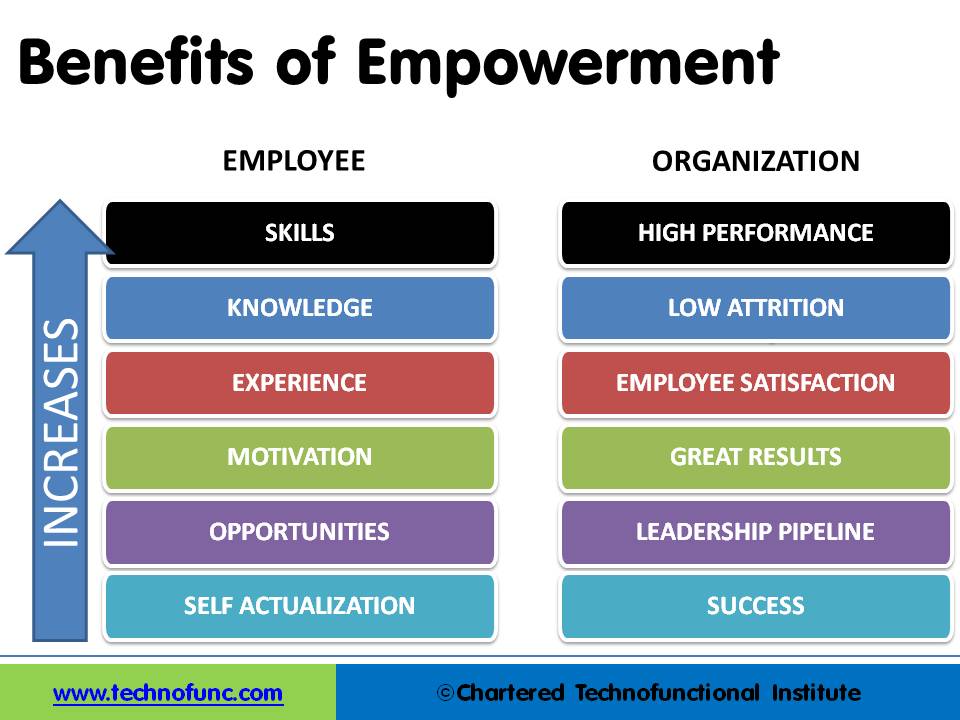- Home
- Business Processes
- Industry Knowledge
- Aerospace Industry
- Automotive Industry
- Banking Domain
- BFSI Industry
- Consumer/ FMCG Industry
- Chemicals Industry
- Engineering & Construction
- Energy Industry
- Education Domain
- Finance Domain
- Hospitality Domain
- Healthcare Industry
- Insurance Domain
- Retail Industry
- Travel and Tourism Domain
- Telecom Industry
- Leadership Skills
- eLearning
- Home
- Leadership
- Team Leadership
- Benefits of Empowerment
Benefits of Empowerment
Teams are certainly very relevant and important elements in today’s high-performance organization but the important thing to remember as a leader is that we can’t simply rely on putting highly effective individuals together to make a highly effective team. Empowerment increases the effectiveness of the team and drives many intangible benefits both for the organization and the employees.
Effective teams often require the right mix of people, skills, resources, and a focus on building good working relationships. Empowering your team members allows leaders to utilize the skills, knowledge, experience and motivation of their entire talent base. Let’s understand how to empower your team members to achieve great wins!
What is Empowerment?
Empowerment is the authority or power given to someone to do something. Empowerment refers to the delegation of some authority and responsibility to employees and involving them in the decision-making process, not in mere job activities, but rather at all the levels of management. Empowered employees develop loyalty and trust and they are proud to be working for the company and are eager to contribute to company success. People can be “empowered” to make decisions at work. They can be “empowered” to speak up with new ideas. Employees can also be “empowered” to act when the integrity of the organization is at stake.
Benefits to the Employee
Empowerment provides new opportunities to your team members to develop and stretch beyond their current capabilities and acquire new skills. It helps in increasing their motivation level, creates new opportunities to develop their leadership skills and satisfy their self-actualization needs. Empowered employees have increased self-confidence, are keen to develop their own skills, and also to find ways to make use of those skills to the company's benefit.
It brings a sense of ownership to the employee due to which he personalizes the goals and objectives of the organization and associates his success with his own abilities. Also, the performance of the employee improves as he attaches self-induced rewards with his performance by making decisions pertaining to the problem and sees the results (success) that follow.

Benefits to the Organization
On the other hand, it brings immense benefits to the organization and to the project or the program. Performance increases, people feel more satisfied and there is low attrition. You can achieve great results and exposure builds the leadership pipeline for your organization. Empowerment is all about mutual success where everyone wins.
Empowerment increases the organization’s responsiveness towards the problems or issues. Also, there is an increase in the productivity of an employee as he is completely engaged with the firm and takes decisions for the betterment of the organization as a whole. The benefits are numerous and well-documented — happier, more productive employees, a higher level of engagement, enhanced customer service, reduced stress, increased innovation, more pride and loyalty, less stagnancy, and an organization that is more adaptable to change. Plus, it just makes the workplace more pleasant for everyone.
Empowering your team is not difficult, but it does require a conscious effort. A tremendous shift in thinking is required by both leaders and professionals to make empowerment work.
Related Links
You May Also Like
-
Tools for Developing Your Team
If a manager has too many weak spots in the talent of the team, the ability to empower the team members to independently execute the project is impaired. Assignments fall behind schedule or stretch out because the needed skills or knowledge are not in place when needed. To successfully execute important projects, hiring talented people, and increasing the talents of existing staff are most important.
-
Teams are certainly very relevant and important elements in today’s high-performance organization but the important thing to remember as a leader is that we can’t simply rely on putting highly effective individuals together to make a highly effective team. Empowerment increases the effectiveness of the team and drives many intangible benefits both for the organization and the employees.
-
Creating Highly Effective Teams
How do we create effective teams? What comes to mind when you think about an effective team? High performing teams exhibit accountability, purpose, cohesiveness, and collaboration. It is a team that works seamlessly as a whole. Everyone brings unique talents and strengths and support each other to bring out the best in everyone. How do you create one?
-
Share Information with Your Team
Willingness to share information is the most critical and the very first step in the Journey to employee empowerment and team development. People cannot make good technology or business decisions without information. They need to understand the purpose behind what they are doing and connect with the big picture. People with information feel the need to take the risk of making decisions that enable business growth.
-
Generating Ideas using Brainstorming
The brainstorming technique was developed by Alex F. Osborn in 1957 and brainstorming means where a team of members generates a large amount of alternative fruitful ideas on a specific problem without any criticism and then evaluates each idea in terms of their pros and cons. Brainstorming techniques fall into four broad categories: visioning, exploring, modifying, and experimenting.
-
Team leadership theory is a recent leadership theory that does not discriminate between the leader and the other team members. The approach considers contributions from each team member to be critical for organizational success. This approach focused on the overall team effectiveness and team problems are diagnosed and action is taken to remediate weakness. This approach provides for taking corrective action when the leader deems necessary.
-
Evidence of the medically damaging symptoms of work stress necessitates applying the treatment of stress management. Stress management is increasingly drawing the attention to the management experts not only as a remedial measure but also as a way to resource management. If the workplace can be made a little more lovable the increase in the achievement of the organization may be much time more. If group stress can be removed by introducing group discussions and recreational facilities a long-lasting team spirit may get developed.
-
In this study of power, Raven identified five bases of power as coercive, reward, legitimate, referent, and expert. The 5 Types of Power can help you decide when it is appropriate to use a particular type of power in important situations. Leadership involves authority and it is very important for leaders to understand what type of power they're using.
-
Tips for Effective Time Management
After studying and analyzing how time is spent, why time is wasted, and where time is wasted you need to decide about the changes required for effective utilization of time. For this purpose, a large number of remedial measures can be taken by you. The first and foremost determinant of a planned and purposeful utilization of time is to develop consciousness of the value of time at all levels of the organization. Planning, goal setting, and defining priorities are concerns to addressed immediately.
-
Many people think communication is easy. It is said that communication can never be a hundred percent complete. Many factors are involved in the process of communication and something can always go wrong with one or more of these. It becomes difficult and complex when we put barriers in communication. Recognize barriers to interpersonal communication and examine specific strategies for overcoming those barriers.
Explore Our Free Training Articles or
Sign Up to Start With Our eLearning Courses

About Us
Learning
© 2023 TechnoFunc, All Rights Reserved










